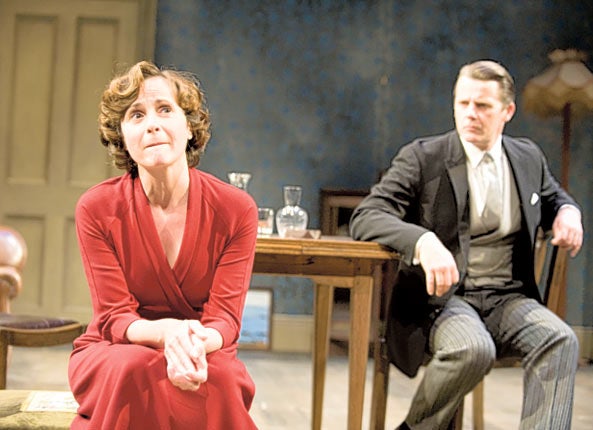The Deep Blue Sea/Rattigan's Nijinsky, Chichester Festival Theatre

Your support helps us to tell the story
From reproductive rights to climate change to Big Tech, The Independent is on the ground when the story is developing. Whether it's investigating the financials of Elon Musk's pro-Trump PAC or producing our latest documentary, 'The A Word', which shines a light on the American women fighting for reproductive rights, we know how important it is to parse out the facts from the messaging.
At such a critical moment in US history, we need reporters on the ground. Your donation allows us to keep sending journalists to speak to both sides of the story.
The Independent is trusted by Americans across the entire political spectrum. And unlike many other quality news outlets, we choose not to lock Americans out of our reporting and analysis with paywalls. We believe quality journalism should be available to everyone, paid for by those who can afford it.
Your support makes all the difference.Terence Rattigan never wrote openly about the love that dare not speak its name. His gift was for attacking the English dread of emotional commitment through drama that is predicated on understatement and obliquity, with women as surrogate taboo-breaking saboteurs. In arguably his best play, The Deep Blue Sea (1952), Rattigan's experience of unequal passion and suicidal desperation is expressed via the fate of Hester Collyer, a judge's wife whose erotic infatuation with a dashing but shallow ex-RAF fighter pilot drives her to try to end it all.
In its centenary celebrations of the author, who died in 1977, Chichester Festival Theatre has had the inspired idea of presenting The Deep Blue Sea with Rattigan's Nijinsky, a new play by Nicholas Wright that teems with insights about why the dramatist suppressed the one work in which he looked set to break free from the closeted creative habits of a lifetime.
The BBC was thrilled with a screenplay he delivered in 1974, about a love affair between the great ballet dancer and the impresario Sergei Diaghilev. Nijinsky's widow, Romola, objected to the depiction of her husband as a homosexual. Was her intervention a providential alibi for Rattigan? He had reasons to cling to his inhibitions, as an artist who thrived on subtext and as a son habituated to the subterfuge imposed by a homophobic society.
Philip Franks directs both of these unevenly acted but persuasive productions. In Rattigan's Nijinsky, the screenplay keeps spilling into the Claridges suite of the dying author, who is played with impressive suavity and vulnerability by Malcolm Sinclair. His drug-and-drink-induced state allows for left-field chats about boys and the link between creativity and producers with Jonathan Hyde's orotund and dogmatic Diaghilev. Would Rattigan have been a better playwright with Diaghilev as his producer rather than a repressive queen, Binkie Beaumont?
The powerful production of The Deep Blue Sea suggests otherwise. Pip Donaghy brings a brilliantly oddball edge to the eastern European doctor, evidently struck off for a homosexual "offence", who gives Hester instinctive fellow-feeling. In Rattigan's Nijinsky, Joseph Drake, slighter than the chunky animal-deity dancer, superbly suggests the differently-wired oddity of this disconcerting genius.
In rep to 3 September (01243 781312)
Join our commenting forum
Join thought-provoking conversations, follow other Independent readers and see their replies
Comments